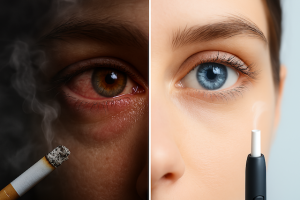Researchers at CoEHAR recently published a unique study in scientific literature, analyzing the effects of cigarette smoke, aerosol from heated tobacco products, and nicotine on microglia cells, the “sentinels” of the central nervous system. The research shows an alteration in cellular physiology, resulting in premature aging, which implies nearly double the risk of more severe consequences in the presence of cognitive diseases.
First study in scientific literature to evaluate the inflammatory response of microglia cells under standardized conditions when exposed to cigarette smoke, aerosol from heated tobacco products, and pure nicotine.
The data shows an alteration in the physiology of these cells which, when exposed to external stimuli, will have an altered response with more severe consequences for smokers compared to non-smokers.
Almost 50% decrease in the protein responsible for the microglia cells’ response due to cigarette smoke: as a result, the cells age 5 times faster.
Catania, 3 October, 2024 – Cigarette smoking causes a progressive deterioration in the health and quality of life for smokers of all ages. On average, smokers sacrifice at least 10 years of life expectancy compared to non-smokers. Additionally, the over 4,000 chemicals released by combustion lead to a defective cellular signaling and accumulation of malfunctioned proteins . Smoking is known to be an environmental aging factor, inducing oxidative stress in various organs, including the brain, and negatively impacting neurocognitive and neuropathological conditions, doubling the risk of developing dementia, Alzheimer’s, and stroke.
However, there is insufficient experimental data showing how smoking directly alters cell physiology in a way that induces pathological changes leading to cognitive damage.
For this reason, CoEHAR researchers, in collaboration with some of the most prestigious international research centers associated with Temple University (USA) and King Saud University in Riyadh, conducted an in vitro study to evaluate and compare the impact of cigarette smoke, aerosol from heated tobacco products, and pure nicotine on microglial function, focusing particularly on the toxicological profile, inflammatory response, and oxidative stress under clinically relevant conditions.
The study, unique in its field, demonstrated that, under these experimental conditions, nicotine and heated tobacco products did not show significant toxicity, while cigarettes caused a marked reduction in cellular vitality.

“Various studies have shown that the toxic substances released by cigarette smoke can have consequences in terms of oxidative stress and neuroinflammation, but the results have never been tested under standardized and clinically relevant conditions,” explains Prof. Giovanni Li Volti. “We tested the response of microglia cells, highly specialized resident immune cells that act as sentinels in the brain, to cigarette smoke, aerosol from a modified-risk product, and nicotine. We observed an alteration in the protein responsible for activating the cell’s antioxidant defenses, leading to changes in cellular physiology, which results in an altered response in the case of pathological conditions. Simply put, a smoker’s cell ages 5 times faster than that of a non-smoker, and, if a severe pathological condition occurs, it is no longer able to respond properly.“
The study does not represent a model for the development of neurodegenerative diseases, but it provides a detailed picture of the cellular response to external stimuli: this pattern of premature cellular aging suggests, for example, that a smoker affected by a stroke will have worse outcomes and consequences compared to a non-smoker.
“It is interesting to note that these results are consistent with the hypothesis that toxicity may depend more on combustion products than on the direct effect of nicotine or exposure to aerosol from heated tobacco products.”
In conclusion, the study shows that heated tobacco products and nicotine significantly reduce toxicity compared to cigarette smoke, although they are not entirely risk-free products. The findings provide valuable insights into the implications of cigarette smoke in neuroinflammation and neurodegeneration and could offer a potential rationale for developing harm-reduction strategies for heavy smokers.




